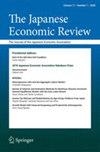串通与情报交换
IF 0.5
4区 经济学
Q2 ECONOMICS
引用次数: 0
摘要
反垄断当局认为,交换单个公司的销售数据比交换总体销售数据更不利于竞争。在本文中,我调查了这种企业间信息交换的反垄断含义。我认为在某些情况下,这两种类型的信息交换都是反竞争的。更准确地说,我将允许每种类型的信息交换时的利润与公司只能观察自己的销售(斯蒂格勒的秘密降价模型)时的利润进行了比较,前者比后者更大。我也提供了一个一般的方法来约束均衡利润没有这样的信息交换。本文章由计算机程序翻译,如有差异,请以英文原文为准。
Collusion and Information Exchange
Antitrust authorities view that exchange of individual firms’ sales data is more anti-competitive than that of aggregate sales data. In this paper, I survey antitrust implications of such inter-firm information exchange. I argue that both types of information exchange are anti-competitive under some circumstances. More precisely, I compare profits when each type of information exchange is allowed to that when firms can only observe their own sales (Stigler’s secret price-cutting model), and the former is bigger than the latter. I also provide a general method to bound the equilibrium profits without such information exchange.
求助全文
通过发布文献求助,成功后即可免费获取论文全文。
去求助
来源期刊

Japanese Economic Review
ECONOMICS-
CiteScore
2.70
自引率
0.00%
发文量
15
期刊介绍:
Started in 1950 by a group of leading Japanese economists under the title The Economic Studies Quarterly, the journal became the official publication of the Japanese Economic Association in 1959. As its successor, The Japanese Economic Review has become the Japanese counterpart of The American Economic Review, publishing substantial economic analysis of the highest quality across the whole field of economics from researchers both within and outside Japan. It also welcomes innovative and thought-provoking contributions with strong relevance to real economic issues, whether political, theoretical or policy-oriented.
 求助内容:
求助内容: 应助结果提醒方式:
应助结果提醒方式:


